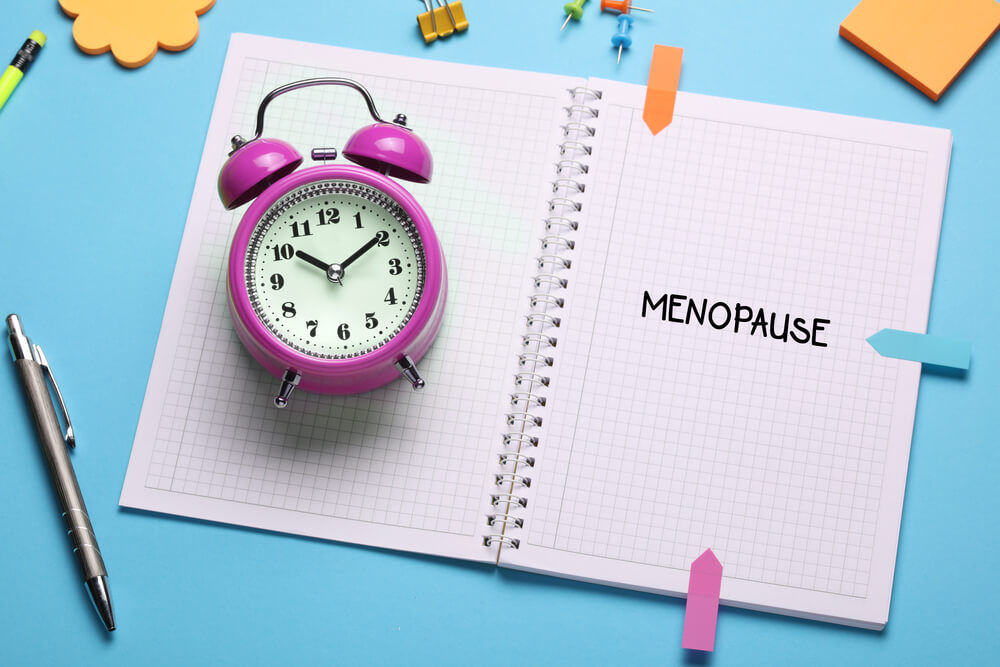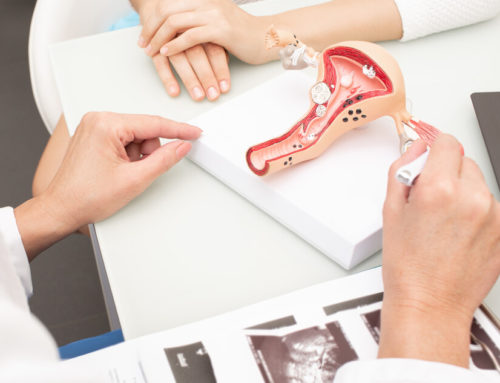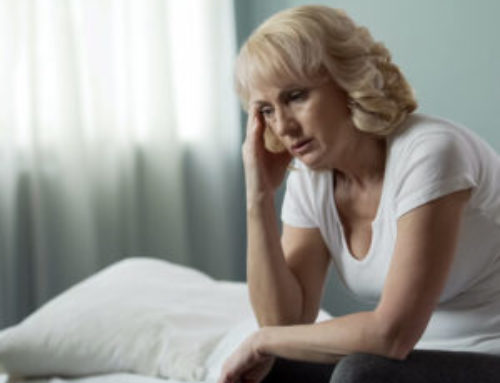What is Menopause?
Menopause is the stage in a woman’s life when reproductive hormones naturally decline and monthly menstrual periods have stopped for at least one full year. During menopause, or sometimes prior to menopause, women begin to experience symptoms such as hot flashes, mood changes, sleep problems, slow metabolism, fatigue, and more. Many of these symptoms subside with time, but additional symptoms may arise such as vaginal dryness, stress urinary incontinence, insomnia, and others.
The onset of menopause is typically in a woman’s 40s or 50s, but in the United States, the average age is 51. It is a natural occurrence in middle age because the body has a shift in hormones and stops ovulating, ending your menstrual period. There are technically three stages of menopause.
- Perimenopause – the months to years (on average 2-4 years) before menopause during which the ovaries slowly start to produce less estrogen
- Menopause – the time when menstrual periods have stopped for at least one full year
- Postmenopause – the stage of life when you have not had a menstrual period for 12 months or longer
How your body handles this shift and the symptoms you may experience are unique to you and it is usually a very normal part of life. Sometimes, other factors can cause premature menopause, such as surgery or certain genetic conditions. Your hormones remain low once you are postmenopausal, and you will no longer experience menstruation or become pregnant. It is vital to stay healthy during this new phase of life, and it is important to know about postmenopausal conditions and actively engage in ways to reduce your risks.
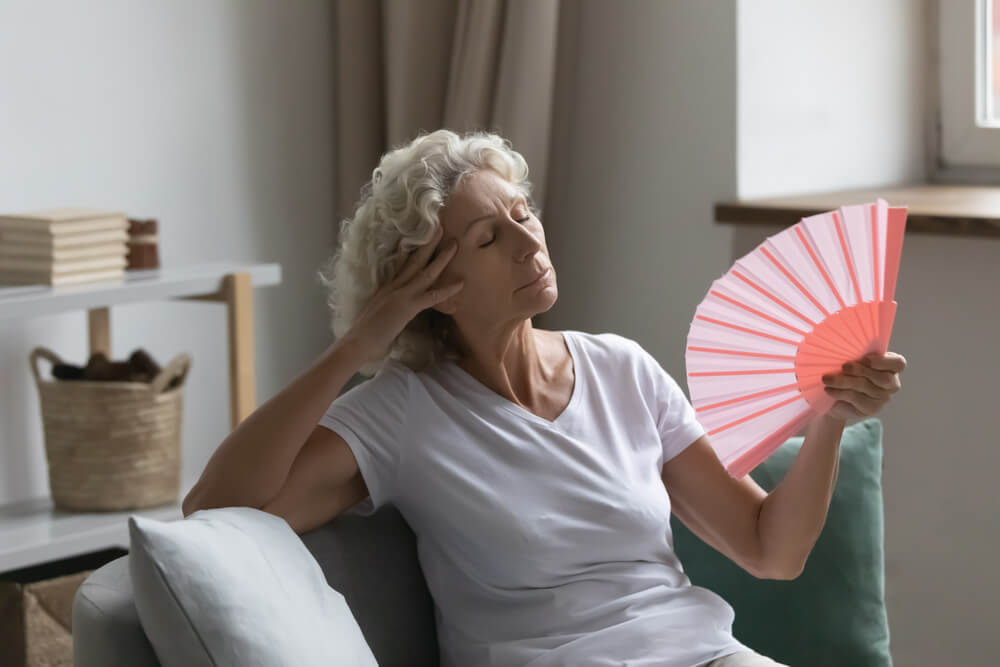
What Increased Health Risks Are Associated with Menopause?
Unfortunately, you are more at risk for specific conditions like osteoporosis and cardiovascular diseases after menopause. Therefore, it is imperative to develop healthy lifestyle habits before and after menopause in order to decrease these risks. Here is a list of some health risks associated with menopause:
-Cardiovascular or heart disease, caused by the decline in estrogen
-Osteoporosis, or the bones becoming brittle, weak, and more susceptible to breaks
-Urinary incontinence, or frequent, sudden urges to urinate with an involuntary release of urine
-Weight gain from a slowed metabolism
-Complications with sexual function, including vaginal dryness, discomfort, and irritation, and the reduction in sexual libido due to decreased sensation
By checking in with your doctor regularly and adopting healthy lifestyle habits, you will often be able to successfully manage risk factors involved with these conditions. Oftentimes, your doctor can prescribe medication to help treat these conditions if lifestyles changes are not completely treating your symptoms.
What Are the Symptoms of Menopause?
Because such a major shift in hormones occurs during menopause, many women experience a variety of symptoms. There are symptoms you may have heard of, like hot flashes, but there may be other symptoms that are new to you. Here is a list of the symptoms of menopause and some tips and tricks to help treat them. If the solutions we have suggested are not working well enough, you should schedule a consultation with your doctor to further discuss your symptoms and to possibly be prescribed medication if necessary.
1. Hot Flashes
Hot flashes are perhaps the most well-known and most bothersome symptom of menopause. You can help manage your symptoms by avoiding certain triggers, such as heat, hot foods or beverages, alcohol, and caffeine.
2. Night Sweats
Night sweats are hot flashes that occur at night. Since this can affect your sleep, we recommend lowering the thermostat and using breathable, cooling bedding materials to help. Deep breathing and yoga can also reduce the severity and frequency of hot flashes.
3. Vaginal Dryness
Vaginal dryness is a very common menopausal symptom. It is caused by a significant decrease in estrogen and can lead to vaginal irritation or discomfort. Vaginal dryness can also cause pain during intercourse. If untreated, it can also lead to more frequent vaginal infections or urinary tract infections. Over-the-counter lubricants can often help these symptoms. There are several other medications available but they often require a prescription from your doctor.
4. Weight Gain
Because there is a shift in hormones during menopause, it is much easier to gain and keep on weight. Regular exercise, including cardio and weight training, will help manage and reduce your symptoms as well as maintain healthy eating habits.
5. Decreased Libido
With a drop in estrogen often comes a decrease in libido during menopause. Talk to your doctor about what treatments are right for you to maintain your desired intimate life and needs. This shift in hormones can additionally cause vaginal dryness and painful sex after menopause. Talk to your doctor today if you have been experiencing painful sex after menopause, as treatments are available.
6. Heart Palpitations
Palpitations can occur in perimenopause due to hormonal fluctuations, but it is important to note that palpitations, shortness of breath, and dizziness require a trip to the doctor or hospital to rule out more severe conditions.
7. Changes in Cholesterol
Estrogen helps regulate cholesterol, keeping the bad LDL low and HDL stable. If you healthily approach menopause by maintaining a heart-healthy diet and exercising, you can avoid this fluctuation in your cholesterol.
8. Emotional Shift
During menopause, you may experience an emotional shift that leaves you feeling less social at times, but this is normal. If you believe you are experiencing something more serious such as depression, or your everyday work and social life are becoming affected, speak to your doctor.
9. Dry Skin
Menopause causes a decrease in estrogen which can create dryness and flakiness in the skin, hair, and scalp. Be sure to use hydrating products such as moisturizers and oils if needed.
10. Menopause Cramps
While many women experience pelvic cramps during their menstrual period, cramping may also occur during perimenopause. Cramping during postmenopause may sometimes be a sign of an underlying condition. Contact your doctor if you experience cramping or bleeding after menopause as a pelvic ultrasound may be warranted.
11. Breast Pain
If you are experiencing breast pain during perimenopause, it may be transitional and will likely go away once your period ends. If your pain does not improve with time or you are experiencing other symptoms, you should schedule a visit with your doctor. If you are experiencing breast pain after menopause, further evaluation is often recommended and you should schedule a visit with your doctor.
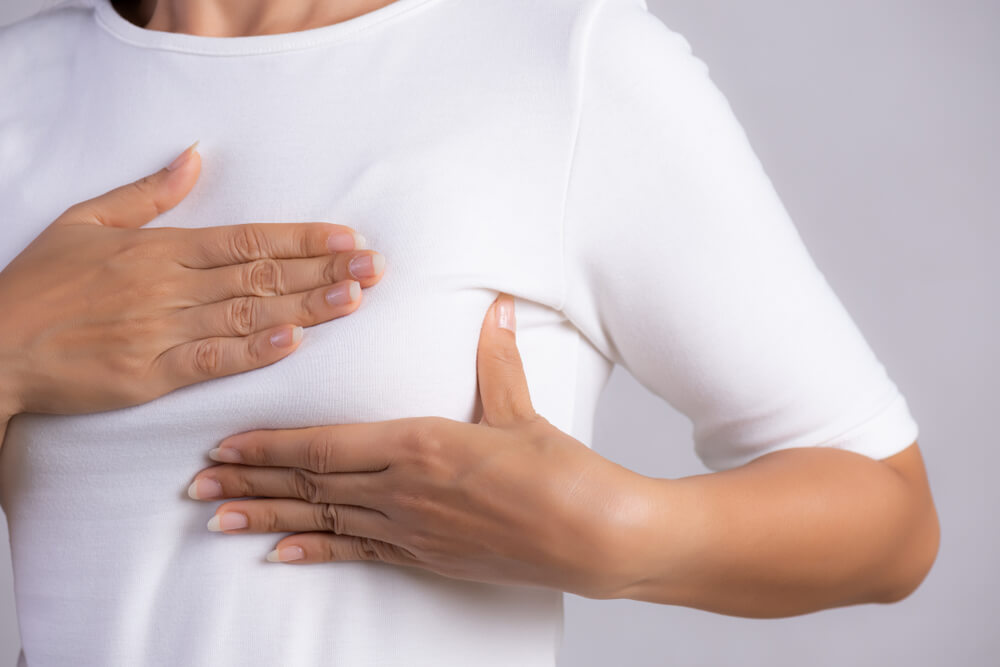
12. Bleeding After Menopause
Know that bleeding or periods after menopause is NEVER normal. If you have any bleeding at all, even if it is a small amount of pink tinge after wiping, you should notify your doctor or OBGYN as soon as possible. While this symptom is most likely due to vaginal dryness, it is important to rule out an underlying malignancy like uterine cancer.
Can You Get Pregnant After Menopause?
After menopause, women no longer produce eggs and cannot become pregnant through sexual intercourse.
What Are The Causes of Menopause?
The primary cause of menopause is a natural decline in your reproductive hormones. As you age, your ovaries make less estrogen and progesterone which are the hormones that regulate your menstruation and fertility. Once you enter your 40s, menstruation changes until the ovaries eventually stop releasing eggs and your periods stop. There are some other causes of menopause as well, including:
- Oophorectomy, or surgery that removes the ovaries
- Chemotherapy or radiation therapy
- Primary ovarian insufficiency, or the ovaries failing to produce normal levels of reproductive hormones (often seen when menopause occurs under age 40)
What Are Some Treatments for Menopause?
While menopause is a natural and normal process, the symptoms can be physically and emotionally disruptive and may affect your mental health. Whether you are working through hot flashes, emotional symptoms, insomnia, or fatigue, many successful treatments are available to treat the symptoms of menopause. Here are some ways you can take control of your symptoms:
- Hormone replacement therapy (HRT) is typically a combination of estrogen and progesterone medications. These hormones are reintroduced to your body to replace the loss that occurs in menopause. You can utilize HRT through skin patches, gel, or oral tablets. You may have heard about or read about hormone “pellets” that get implanted under the skin surface to treat menopause. Be aware that hormone pellets are NOT regulated by the FDA and are, therefore, considered risky to use. Any doctor that is not willing to first prescribe you the standard HRT medications should be considered a red flag and going against the standard of care.
- Maintaining healthy nutritional habits before and during menopause is vital to reducing the risk of developing health conditions and risks associated with menopause. For example, consistent, good nutrition that includes calcium-rich foods also aids in bone health and combats osteoporosis, which is often seen in menopause. A healthy balanced diet can also decrease cardiovascular risks associated with aging.
- Exercise not only improves mood and combats sleep disturbance, but it helps you to maintain a healthy weight to limit or decrease excess body fat that may make you more susceptible to health risks. Exercising with weights is also crucial in maintaining bone health.
What To Expect from Life After Menopause
We here at New Age Women’s Health encourage you to embrace perimenopause, menopause, and postmenopause. Though it can present challenges, and you may be frustrated by the symptoms of menopause, it can be a rewarding life-changing experience with the right outlook and support system. At New Age Women’s Health, we look forward to being part of that support in your journey through menopause. Give us a call or visit your website today!


